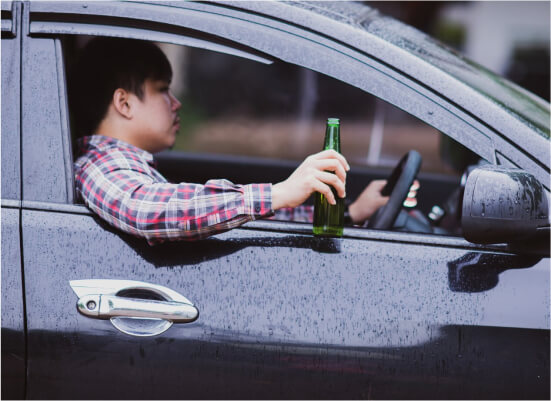In the United States, having a blood alcohol content of .08 or higher immediately proves that you are drunk. Hence, operating a motor vehicle with a blood alcohol content of .08 or higher means that if pulled over by a police officer, you will immediately be charged and proven guilty for driving under the influence of alcohol. It does not matter if you do not appear to be intoxicated, are not staggering or stuttering. Any case of blowing a BAC of .08 or higher results in immediate conviction.
I have a DUI, what happens now?
In our experience, we have found that police misconduct is the best defense for wrongfully pulling somebody over for a DUI. This includes an unlawful DUI stop, misconduct in the field sobriety test while it is being administered, and any one of a strict set of rules that an officer must follow when performing the test. If any one of the rules and guidelines are not met, the court has reason to eliminate the case altogether. To complement this fact, AMA Law has formulated a list of questions and checks to ensure that any test the officer performed was carried out properly. These questions include:
- Was the Breathalyzer calibrated properly?
- Could there be another reason that you failed the field sobriety test?
- If administered a breath test, were you instructed to “keep blowing” by the administering officer?
Our team of attorneys has created a rigorous set of questions and tests that help truly determine if the charge is correct in assumption and administration of an intoxicated driver. If we find that you were wrongfully stopped or the test wasn’t administered correctly, we will present the evidence in court, and request that the case be thrown out.
Why is it important to never have a DUI conviction?
When convicted of a DUI in court, you are ordered to pay a fine and court costs, followed by revocation of your driver’s license and in some states, mandatory jail time (even for first offenders). The length of jail time varies from state to state, but in every state you are hit with a fine and license revocation. At the end of your license revocation period, you cannot simply renew your license. There are courses and schooling that each DUI convict is required to go through for which the difficulty and length varies depending on your initial evaluation when admitted to the school. These evaluations are designed to determine if you have an alcohol abuse problem or alcohol dependency problem. In between conviction and license renewal, there are a mountain of requirements and blocks designed to keep you off the streets. Even after the renewal of your license, Ignition Interlock devices can be assigned to the driver, which require the driver to blow a BAC level of 0. These devices and monitoring systems are very costly and come at the cost of the driver, not the state.
More costs!
As a convicted drunk driver, you are required to purchase SR-22 insurance before legally operating a vehicle. The cost of SR-22 insurance is usually 2-3 times the cost of normal insurance. Finally, drunk driving affects your job. If convicted of drunk driving, you could immediately lose your job. If your job requires security clearances, bonding, or other security requirements, you can count on not having a job as well.
When convicted of drunk driving, your quality of life immediately is at risk. This is why AMA Law in Oklahoma fights to keep your record clean, no matter what the cost. If you decided to drive drunk, don’t make the decision to go to court without AMA Law on your side. Visit our DUI page for more information or Contact us today for a free consultation.
